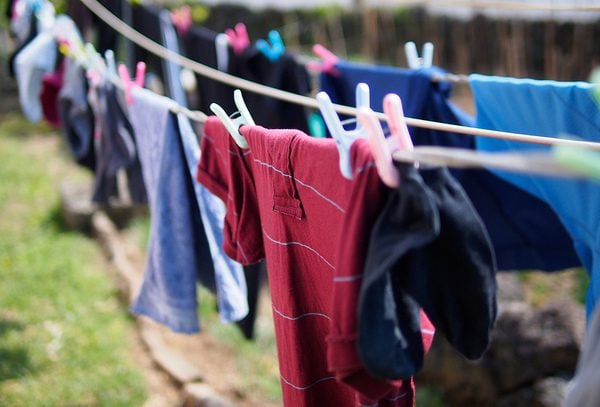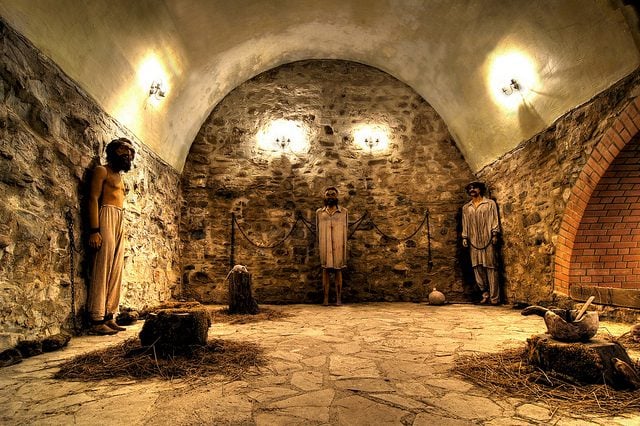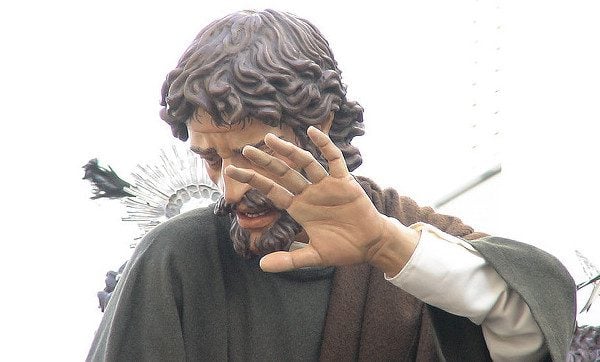Sacrament
After Jesus climbed up
out of Death
the first thing he did
was the laundry.
He creased the shroud
that covered his face,
just so,
and placed it back
where it belonged.
He could have left it in
a messy pile
in a hurry
to file his taxes on time
or make that lunch date
to outrun death again
with a long list of errands.
But he took the time
in the tomb
to fold the laundry
like he had eternity
on his side.
Maybe it was just that
he dearly loved the marvel of
fabric,
the hands, earth, and magic
that made it,
the first thing he touched
when the wind blew back
into his beaten-up lungs.One thing is for sure:
No one ever thinks
of the laundry
as resurrection.
But both
never
end.
+++++
Jesus cooks and does the laundry. This, by far, is the most striking feature of the resurrection stories in John’s gospel. The first thing he does after he’s resurrected is to fold the laundry. And the last thing he does on earth is to cook a meal for a friends.
As a stay-at-home dad whose life revolves around these two never-ending activities, there’s something astounding about this that I can’t quite wrap my head around, a quietness to this realization that refuses to be explained in a neat and tidy way.
Jesus led this remarkable life of revolution. His death was political, his message a threat to the powerful of his time. He went on a tireless three-year mission, a dizzying pace of travel, preaching, and miracling throughout the region. His final week — marching on Jerusalem during the protest of Palm Sunday and then being unjustly arrested and executed — has a frenetic, almost desperate pace. It feels urgent, immediate, and breathless.
And then, he dies, lies in the quiet tomb, and is at last resurrected to great confusion.
In our own confusion and doubt, celebration and rejoicing of Easter, I think we might overlook something about the resurrection.
It’s a little prosaic, boring even. I know that sounds horrible, but it’s actually something of a marvel to me.
After such the wild pace of Holy Week, filled with so many shocking and heartbreaking events, the resurrection, by comparison, seems downright sedate. There’s almost a languid quality to it, like Jesus is stretching out with a deep, holy breath, yawning himself from the tomb.
He’s no longer doing miracles for the masses. He’s no longer directly confronting the Powers that Be. He’s no longer teaching in synagogues, or leading a movement, or marching on Jerusalem. He’s just doing a few simple things, slowly: gardening, walking, eating, laundry, and cooking.
The first thing he does is to fold up the shroud neatly and to take care with his linen grave clothes. That detail delightfully interrupts the reading of John’s Easter story every year for me. Amid the confusion and fear, and maybe a touch of elated hope, there is the laundry, neatly folded in the tomb.
I mean, who does that? The first thing Jesus does when he comes back is the laundry? He folds clothes?! It’s enough to make my whole heart warm with his presence like a load of whites straight from the dryer. It’s enough to make me believe in the glorious weirdness of resurrection.
And then, in the final verses of the final chapter in our final gospel we realize that Jesus, for all his talk of feeding, for all his multiplication of loaves and fish, for all the times he feasted with sinners, tax collectors, and Pharisees, has apparently never cooked a meal of his own, at least not one worth remembering, until he’s resurrected.
Meals feature so heavily throughout the gospels. Jesus presided over many feasts and meals. But he apparently didn’t take the time to cook them himself. He certainly took the time to criticize those like Martha who did spend so much time cooking, but we never see him actually cooking a meal in the gospels.
But here, the last thing Jesus does on earth is cook a meal, his first recorded one, and then he commands Peter to feed his sheep. In the resurrection, it seems, Jesus institutes the sacrament of housework and everyday chores. Now if only there had been lawns to cut in first-century Palestine.
But it’s almost as if Jesus is asking us to pay attention to the slow and the ordinary as the place where we are most likely to find resurrection, not in the hectic busy-ness of trying to change and transform the world, our churches, and our lives.
Or maybe he’s trying to tell us that if we want to change the world or even ourselves, we should cook a meal or do the laundry, because if that can’t lead us to Jesus, to love, to transformation, well, then nothing probably will.
++++
This post is brought to you by my generous patrons, India Henson Yoga, Layla Barera, Bill Campbell, Chris Graham, Terrie Lehi, Roseanna Goodman, and many more. If you enjoy my posts or find them meaningful, please consider supporting my work by pledging —even just $1 — at Patreon.
Image Credit: “Drying Laundry” by Kim Myoung Sung (Flickr Creative Commons).
.













